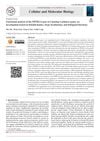 26 citations,
December 2011 in “Journal of Investigative Dermatology”
26 citations,
December 2011 in “Journal of Investigative Dermatology” New gene identification techniques have improved the understanding and classification of inherited hair disorders.
[object Object]  25 citations,
May 2003 in “Expert Opinion on Therapeutic Patents”
25 citations,
May 2003 in “Expert Opinion on Therapeutic Patents” Steroid Sulfatase inhibitors show promise in treating hormone-dependent disorders like cancers, hair loss, and acne, with 667COUMATE being a potential candidate for breast cancer treatment trials.
 18 citations,
June 2017 in “Proceedings of the National Academy of Sciences of the United States of America”
18 citations,
June 2017 in “Proceedings of the National Academy of Sciences of the United States of America” A gene called Gk5 controls lipid production in the skin and affects hair growth.
 17 citations,
August 2012 in “Journal of Medical Genetics”
17 citations,
August 2012 in “Journal of Medical Genetics” A new mutation in the XEDAR gene might cause a rare skin condition called hypohidrotic ectodermal dysplasia.
 17 citations,
December 2006 in “Gene Expression Patterns”
17 citations,
December 2006 in “Gene Expression Patterns” Scube3 gene affects mouse embryo growth in multiple areas, but needs more research.
 15 citations,
December 2020 in “Pharmacology Research & Perspectives”
15 citations,
December 2020 in “Pharmacology Research & Perspectives” Blocking enzymes that help the virus enter cells could be a promising way to treat COVID-19.
 15 citations,
January 1971 in “British Journal of Dermatology”
15 citations,
January 1971 in “British Journal of Dermatology” Hair can indicate early signs of metabolic disorders, with issues like protein deficiency stopping hair growth.
 14 citations,
March 1995 in “Journal of cell science”
14 citations,
March 1995 in “Journal of cell science” SV40 T antigen in hair follicles causes abnormal hair and health issues in mice.
 11 citations,
February 2019 in “Research and reports in forensic medical science”
11 citations,
February 2019 in “Research and reports in forensic medical science” DNA phenotyping helps predict physical traits from DNA with varying accuracy and requires careful ethical and legal handling.
 11 citations,
March 2008 in “Experimental Dermatology”
11 citations,
March 2008 in “Experimental Dermatology” A substance called compound-1 could help increase hair growth by maintaining prostaglandin levels in hair follicles.
 10 citations,
March 2019 in “Human Genetics”
10 citations,
March 2019 in “Human Genetics” A genetic mutation in the SGK3 gene causes hairlessness in Scottish Deerhounds and may relate to human hair loss.
 9 citations,
January 2022 in “Theranostics”
9 citations,
January 2022 in “Theranostics” Collagen XVII is important for skin aging and wound healing.
 9 citations,
February 2018 in “The Journal of Dermatology”
9 citations,
February 2018 in “The Journal of Dermatology” A new mutation in the LIPH gene was found to cause a rare hair disorder in a Japanese boy.
 7 citations,
December 2015 in “International Journal of Dermatology”
7 citations,
December 2015 in “International Journal of Dermatology” New and known mutations in the hairless gene cause a hair loss condition called Atrichia with papular lesions.
 7 citations,
December 2013 in “The Journal of Dermatology”
7 citations,
December 2013 in “The Journal of Dermatology” A woman's hair turned gray and fell out after starting a cancer drug called imatinib mesylate.
 5 citations,
July 2014 in “Acta Crystallographica Section D-biological Crystallography”
5 citations,
July 2014 in “Acta Crystallographica Section D-biological Crystallography” Mutations in the enzyme don't significantly change how it binds to its specific substances.
 4 citations,
November 2020 in “BMC Dermatology”
4 citations,
November 2020 in “BMC Dermatology” Researchers identified genes in scalp hair follicles that may affect hair traits and hair loss.
 3 citations,
October 2018 in “Archives of Dermatological Research”
3 citations,
October 2018 in “Archives of Dermatological Research” Applying InlB321/15 to wounds sped up healing in mice.
 1 citations,
July 2016 in “Elsevier eBooks”
1 citations,
July 2016 in “Elsevier eBooks” Understanding skin structure and development helps diagnose and treat skin disorders.
 January 2025 in “Cellular and Molecular Biology”
January 2025 in “Cellular and Molecular Biology” The PIP5K1A gene helps cashmere growth in goats by promoting cell proliferation, and melatonin boosts its expression.
 January 2024 in “Archives of Endocrinology and Metabolism”
January 2024 in “Archives of Endocrinology and Metabolism” A new gene mutation causes insulin resistance in a girl and her mother.
 December 2023 in “bioRxiv (Cold Spring Harbor Laboratory)”
December 2023 in “bioRxiv (Cold Spring Harbor Laboratory)” AP-2α and AP-2β proteins are essential for healthy adult skin and hair.
 December 2021 in “Trichology and cosmetology:”
December 2021 in “Trichology and cosmetology:” Taking Kera-Diet® improves hair and nail health without side effects.
 March 2018 in “Suez Canal University Medical Journal”
March 2018 in “Suez Canal University Medical Journal” New drugs targeting the JAK-STAT pathway show promise for treating inflammatory skin diseases.
 May 2017 in “American Society of Health-System Pharmacists eBooks”
May 2017 in “American Society of Health-System Pharmacists eBooks”  January 2017 in “Jikken doubutsu ihou/Jikken doubutsu/Experimental animals/Jikken Dobutsu”
January 2017 in “Jikken doubutsu ihou/Jikken doubutsu/Experimental animals/Jikken Dobutsu” Mice with a changed Hr gene lose and regrow hair due to changes in the gene's activity.
 November 2014 in “Elsevier eBooks”
November 2014 in “Elsevier eBooks” Gene mutations can cause problems in male genital development.
[object Object]  December 2013 in “Biomedical and biopharmaceutical research”
December 2013 in “Biomedical and biopharmaceutical research” Nanotechnology shows promise for better drug delivery and cancer treatment.

Obesity is linked to many gastrointestinal diseases and needs more research for treatment development.

Wound healing is complex and requires more research to enhance treatment methods.






























